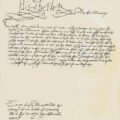Letter to Mary, Queen of Scots, Feb. 1, 1571
Madame, of late time I have receaved divers letters from yow to the which you maie well gesse, by the accidentes of time, whie I have not made anie answer; but spciallie because I sawe no matter in them that required any such answer as could have contented yow, and to have discontented yow had bin but an increase of your impatience which I thought tyme would have mitigated as it doth comminlie where the cause thereof is not truelie grounded and that it be so understand; but now findinge by your last letter the 27th of the last, an increase of your impatience tending allsoe to manie uncomelie, passionate, and vindicative speeches, I thought to change my former opinion and by patient and advised wordes to move yow to staie, or ells to qualifie your passions, and to consider that it is not the manner to obtaine good thinges with evill speeches, nor benefitts with injurious chalenges, nor to gett good to yourself with doinge evill to another.
And yet to avoyd the fault which I note yow have comitted in filling a longe letter with multitude of sharpe and injurious wordes, I will not by way of letter write anie more of the matter, but have rather chosen to committ to my cosin the Erle of Shrewsbury the thinges which I have thought meete upon the readinge of your letters to be imparted unto you, as in a memorial in wrytinge he hath to shewe you: wherwith I thinke yf reason may be present with you, and passion absent at the reading, you will folowe hereafter rather the course of the last part of your letter then the first; the later being wrytten as in a calme and the former in a storme, wishing you the same grace of God that I wish to myself, and that he maie direct you to desire and attaine to that which is meete for his honnor and your quietnes, with contentacion both of bodie and minde. Given at my Pallace of Westminster the first daie of February 1571.
Your Cosyn that wisheth
you a better mynde.
(Source: “Original Letters, Illustrative of English History” edited by Henry Ellis 1827)







